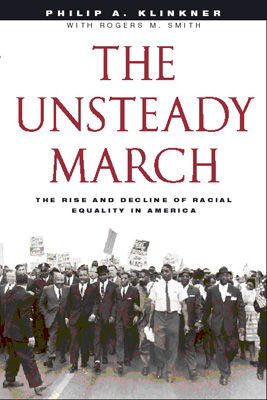 |
The Unsteady March:
The Rise and Decline of Racial
Equality in America
*2000 Robert F. Kennedy Book Award Semifinalist*
*1999American Library Association "Best of the
Best"*
Philip A. Klinkner
with
Rogers M. Smith

The University of Chicago Press
ISBN: 0-226-44339-6
|
Although Americans would like to believe otherwise,
our nation's commitment to racial equality has never been consistent, nor
has it been irresistibly driven forward by America's founding principles.
In The Unsteady March, Philip Klinkner and Rogers Smith disprove
the idea that the United States has been on a "steady march" toward the
end of racial discrimination. Rather, progress has been made only in brief
periods, under special conditions, and it has always been followed by periods
of stagnation and retrenchment.
In their sweeping and accessible history of race relations, Klinkner
and Smith show that significant advances in racial justice have occurred
only when three circumstances have converged: large-scale wars, which require
extensive economic and military mobilization of African Americans; an enemy
that inspires American leaders to advocate inclusive, egalitarian values
in order to justify the war; and domestic political organizations that
are able to pressure those leaders to follow through on their rhetoric.
Klinkner and Smith's history clearly demonstrates that substantial progress
has not yet occurred without these factors working together, as they did
during the Revolutionary War, Civil War, and Cold War eras.
Today we are in a period of retrenchment like those that have followed
previous reform eras. With its insights into contemporary racial politics
and its wealth of historical material, The Unsteady March is a penetrating
and controversial analysis of race relations across two centuries. The
fight for racial equality has not been won, the authors argue, nor will
it be unless we recognize the true factors behind progress and the extraordinary
efforts required to achieve it.
From the book jacket
"America is at a critical juncture in its struggle
with the demon of race. The progressive momentum of the civil rights movement
has dissipated. Efforts to elevate the social status of blacks are being
fought at every turn. And yet, the prisons, welfare rolls, and public hospital
waiting rooms are still crowded with the descendants of African slaves.
In this provocative and closely argued work, Phil Klinkner and Rogers Smith
examine American history that they might better understand the present.
Their book sounds a dire warning. Those concerned to achieve a more just
political order in America are well advised to take heed."
"Philip Klinkner and Rogers Smith have superbly and
clearly charted the ebb and flow of America's racial tides. This is an
important book for anyone worried about our oldest unsolved dilemma."
"A masterful achievement."
John David Skrentny
Associate Professor of Sociology, University of California, San Diego
Author of The Ironies of Affirmative Action
"The
Unsteady March is a throughly researched, brilliantly written, detailed
and unblinking look at relations between blacks and whites in America from
the earliest settlements to the present. In this outstanding work,
Klinkner and Smith bring to life the myriad federal, state, and local policies
and personalities that have combined in focussed fidelity for over 400
years to create the "black" and "white" Americas of today. A must
read for anyone seeking a better understanding of the inescapable, unspeakable
power of race in America. A must read for all Americans.
Read the
Introduction
Book Reviews:
"Civil rights workers sometimes said that for every
step toward racial progress, the community would often slide two steps
back. This "unsteady march" is documented in this unflinching portrait
of the leviathan of American race relations. Klinkner (The Losing Parties)
teaches government at Hamilton College and Smith (a Pulitzer finalist for
Civic
Ideals) teaches race and politics at Yale. They contend that racial
progress hinges on three factors: a pending large-scale war, supportive
government rhetoric, and strong domestic political organziations or advocacy
groups. "The normal experience of the typical black person in U.S. history
has been to live in a time of stagnation and decline in progress toward
racial equality," they assert. There dense and compelling synthesis of
many primary and secondary sources bears out a long history of atrocities
and political maneuvering from the time of the Revolution through the Clinton
presidency, while highlighting the role of the black press and the moods
of various communities. The authors' theories will likely spur debate,
yet they offer scholarly confirmation of a notion widely held in the black
community for many decades. Acknowledging that the modern civil rights
movement has irrevocably transformed this country, Klinkner and Smith conclude
by arguing that there are nonetheless "abundant similarities" between our
racial and political debates and those of the late 19th century. This important
book should be read by all who aspire to create a more perfect union.
Publishers Weekly (Starred Review)
Philip Klinkner is associate professor of government
and director of the Arthur Levitt Public Affairs Center at Hamilton
College. He is the author of The
Losing Parties. Rogers M. Smith is Alfred Cowles Professor of Government
and codirector of the ISPS Center for the Study
of Race, Inequality, and Politics at Yale University. His book, Civic
Ideals was a finalist for the 1998 Pulitzer Prize in History.
Table of Contents
Acknowledgments
Introduction: The Unsteady March
One: "Bolted with the Lock of a Hundred Keys": The Era of Slavery, 1619-1860
Two: "Thenceforward, and Forever Free": The Civil War, 1860-1865
Three: "The Negro Has Got as Much as He Ought to Have": Reconstruction
and the Second Retreat, 1865-1908
Four: "The Color Line": Jim Crow America, 1908-1938
Five: "Deutschland and Dixieland": Antifascism and the Emergence of
Civil Rights, 1938-1941
Six: "Double V: Victory Abroad, Victory at Home": World War II
Seven: "Hearts and Minds": The Cold War and Civil Rights, 1946-1954
Eight: "There Comes a Time": The Civil Rights Revolution, 1954-1968
Nine: "Benign Neglect?": Post-Civil Rights America, 1968-1998
Conclusion: Shall We Overcome?
Notes
Index

Any questions about the book?
Email me at pklinkne@hamilton.edu

